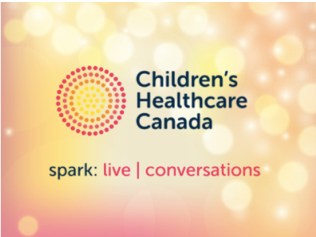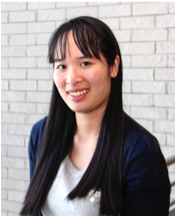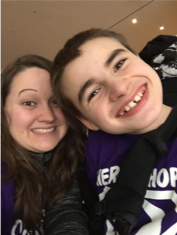
|
|
Greetings FER Alumni!
|
Hello FER Graduates,
We have just recently wrapped up the Winter 2020 Cohort for the FER Course and have 30 new graduates who are now part of the FER Course alumni! Congrats to all the recent graduates, it was a pleasure to get to know and learn with all of you. There are now 99 graduates extending across Canada and internationally.
The research world has changed a lot in the last two months given the impact of the COVID-19 pandemic. If you are a clinician who has been called out to the front-line, we just want to take a moment to say that we wish you strength and safety as you face what's ahead. For those of you at home, doing your part to flatten the curve we thank you and wish you safety and good mental health.
This newsletter is coming a little earlier because I felt that with all that is going on in the world right now it was an important time to reach out to all of you. The following newsletter focuses on resources that may be of interest or helpful during the COVID-19 pandemic. It also features a special COVID interview with a parent graduate from the Fall 2018 Cohort!
A reminder that we have two Facebook groups, which we would love you to join - the Parents Partnering in Research Facebook Group and the FER Course Graduate Facebook Group. If you are interested in joining either group, please send me an email - [email protected]
Take care and keep in touch,
Rachel Martens
Engagement Officer
Kids Brain Health Network
|
|
|
 |
|
Exciting news: KBHN renewed for three more years!
The Networks of Centres of Excellence Program renewed the Kids Brain Health Network (KBHN) for three more years. Part of the network's renewal planning is to identify initiatives that promote the improvement of outcomes for children with neurodevelopmental disabilities and their families. As a result, KBHN will continue to support the Family Engagement in Research (FER) Training Program. More information on the Fall 2020 & Winter 2021 FER cohorts will be announced in June 2020. Here you can read the full article about KBHN's Cycle III announcement.
For more information click
here.
|

|
|
|
Canada's New Q&A Hub for Canadians with Disabilities
#MyCOVIDDisabilityQ Twitter Campaign
Canadians have been asking experts from CanChild, Kids Brain Health Network and CHILD-BRIGHT about child or youth disabilities and the ongoing COVID-19 situation. You can view the questions by visiting the
Q&A Section on our website or participate in the discussions by following
@mycovidquestion and using
#MyCOVIDDisabilityQ hashtag on Twitter!
|
|

|
|
 |
|
|
Books and Podcasts
Book Recommendations
Books on Kindness and Personal Connection in Healthcare:
Birds Eye View by Sue Robins
:
Bird's Eye View is a compelling book of stories sharing a life lived in health care. Written for health professionals - but accessible to all - each chapter offers insight into how it feels to be a vulnerable patient. Poignant and
provocative, this unique book highlights the patient and family experience and includes practical wisdom to inspire us all.
Why We Revolt by Victor Montori:
In a series of brief and personal essays, Why We Revolt describes what is wrong with industrial healthcare, how it has corrupted its mission, and how it has stopped caring. Montori rescues the language of patient care to propose a revolution of compassion and solidarity, of unhurried conversations, and of careful and kind care. Currently free on Kindle.
Podcasts on Patient-Oriented Research and Personal Connection
SPORCast
A weekly podcast discussing the Strategy for Patient Oriented Research from the west coast of Canada put out by one of our FER course graduates, Beverley Pomeroy!
Accidental Intellectual:
Scientists are human, too. So are therapists and doctors. Come join us as we tell human stories of both setbacks and successes and the kind of wisdom that only comes from failing the first time.
|
|
|
 |
Webinars
|
COVID-19: Its Impact on Kids in Pain and their Families
This webinar is co-hosted by Solutions for Kids in Pain (SKIP) and Children's Healthcare Canada. The webinar explores how COVID-19 has impacted children in pain and their families.
Establishing and Managing COVID-19 Command Centres in Hospitals Serving Children and Youth
This webinar features hospital leaders from Ontario and British Columbia regarding their organizational activities to lead and manage response and preparedness measures related to COVID-19.
COVID-19 and the care of the child with chronic disease
The Paediatric Project ECHO and Children's Healthcare Canada have partnered to develop this webinar. The webinar is tailored to pediatric healthcare providers in Canada to answer questions about the care of children with chronic conditions in relation to COVID-19.
|

|
Webinar Series: Patient Partnership in a Time of COVID-19
The CFHI is hosting a series of discussion webinars to facilitate pan-Canadian conversations about patient engagement during this pandemic. The upcoming webinar is Maintaining and Strengthening Patient/Family/Caregiver Partnerships (May 26th, registration
here
), and Wave 4 of COVID-19: Supporting Emotional Well-Being and Mental Health of Patients and Families (April 28th, access
here
)
Recorded CHC CIHR Webinar
The recording of our "Conducting health research during #COVID19: Challenges & solutions for leadership & productivity" #SparkLive panel with @DrCChambers @KC0nn0r @peterjgill @TaylorMorriseau and Amy Oliver is now available:
|
|
KT Connects Knowledge Translation Webinar Series
This presentation provides guidance on methods for integrated and end-of-grant KT during the COVID-19 pandemic and similar periods of social disruption. The webinar will also discuss what to do for research that has been curtailed.
Date: May 29th, 2020 @ 4:00 - 4:45pm ADT
|

|
|
 |
Upcoming Virtual Symposiums, Events, and Conferences
|
2020 Beyond Giving Voice Virtual Symposium Series
'Beyond Giving Voice'
will be hosted as a series of virtual interactive symposium webinars in June 2020. Throughout this symposium, the theoretical, methodological, and ethical implications of claims to be 'giving voice' to children through research will be explored. While presentations will be focused on qualitative research with young people, the knowledge shared will be equally relevant to the design and conduct of methodologies with other populations.
Learn more and register here.
|

|
|
Children's Healthcare Canada Events
Upcoming Spark: live webinars on
Best Practices in Family Engagement and Partnership
This webinar will features:
- Outline collaborative subcommittee approach from goal conceptualization to implementation
- Detail what contributes towards the success of this method
- Highlight key subcommittee goals translated into practice
- Share challenges faced and lessons learned
- Thursday, May 28, 12:00 PM - 1:00 PM EDT
Click here to register and for more information.
For more information on upcoming webinars, click here |
 |
|
Virtual Conference and Poster Submissions!
The 7th Biennial Conference on Developmental Disabilities: Health and Wellbeing across the Lifespan will run a virtual conference this coming November.
This interactive 2020 conference will focus on practical strategies to optimize the quality of life for people with developmental disabilities.
The aim is to help healthcare providers and caregivers learn effective ways of working with people with developmental disabilities, and in partnership with their families, to improve their quality of life experience.
|
The 7th Biennial Conference provides an excellent forum to present work in an interactive setting.
Virtual posters are intended to provide participants from a variety of disciplines with the ability to connect with each other and engage in discussions about the work.
The deadline for virtual poster submissions is coming up shortly.
Submit by: June 10, 2020.
For more information and submit click here.
|
|
 |
Each newsletter we will be featuring KT projects from the FER course. This podcast was created by Jennifer Crowson and Meaghan Rietzel (Winter 2020 FER course graduates). Together they discussed ways that family members can become more involved in a research project, all the way from the planning, implementing, and sharing of research results.
|
|
|
 |
|
COVID-19 and its Effects on Research: A Family Partner Interview
|
|
|
Karen Van Meeteren from the Netherlands (Fall 2018 FER Course Graduate).
|
|
We hope to feature how the experiences of researchers and family partners may have changed during COVID-19. There's a great opportunity here for us to feel connected even though we are apart. Interested in sharing your experiences? Email Rachel at
[email protected]
Today we will be hearing from
Karen Van Meeteren from the Netherlands (Fall 2018 FER Course Graduate).
1. What first inspired you to get involved as a parent partner in research?
Since the birth of my daughter in 2011 I was almost always willing to participate in research as a 'research subject'. I myself have a background in research, I did a Bachelor in Biochemistry and a Masters in Science Education and Communication, so I was already aware of the importance (and the joy) of research. I believe research can help people directly or indirectly in their daily lives. After being a research subject, I got involved with a patient organization. Then, somehow a couple of things came together: I got to know a researcher through a project with the patient organization and at the same time one of her PhD students interviewed me for his research. For this project they were looking for a parent to join as a parent-researcher (as we call it in the Netherlands) and the director of the patient organization recommended me. The researchers already knew me, so I think it was very easy for them to ask me if I wanted to join the team.
2. Tell us about a current project that you are working on.
'A' current project? But I can't choose! Lol! Two weeks before we got 'intelligently locked down' in the Netherlands I started a new project as a project leader. The subject of the research project is resilience and burn-out in parents with a child with a disability. The idea is to really let the project be led by parents and health care professionals and their ideas about what helps parents to stay/become resilient while the life with their child can be very demanding. I am also involved in a project to establish a kind of organization within a university to solidify patient involvement in research, to create an infrastructure to support patients and researchers on a structural basis. And, together with other parents, I'm on the board of a parent-led foundation, OuderInzicht, which also supports patient-involvement in research but county-wide.
3. How has the current pandemic affected your work?
The pandemic heavily affects my work. My daughter is fulltime at home right now and all the home care we had suddenly stopped. My daughter needs 24/7 care and entertainment and help with her homework, not cognitively but physically. I share the care with her father and for the time being we live together again. But this all takes its toll. I'm exhausted and also pretty irritated with the whole situation because I was completely ready to start my new job and working really gives me energy so not being able to work as much as I want is frustrating.
Luckily the subject of my main job right now is perfect for these times: resilience and burn-out. All my colleagues get my current problems and I'm observing myself and other parents (online) a lot to be able to take this knowledge with me to use it for the project.
4. Have you heard anything from other partners about how COVID has affected their work?
I haven't discussed this explicitly with others, but I notice the struggle within others. Our project team had a meeting last week and the other parent-partner on my team asked if it was really necessary to join since she also had a lot of other things to do. And a small project we have with OuderInzicht is put on hold since the parent doesn't have any time left right now with her two children at home.
5. What advice would you have for parent partners during this time and for researchers attempting to continue to work? How can they best support their parent partners?
Sanity & safety first! Be aware of what helps you staying/becoming sane and stable and safe and act on it (whenever you can). Be kind to yourself, you're allowed to experience this as a heavy situation. And you're allowed to say no, to set boundaries and to come back to previous made agreements. This applies to everyone, family members as well as researchers. And then, ask each other what's the best way to help each other, stay in touch with each other and be open and honest.
|
|
 |
|
FER Course Alumni Continue to Partner in Research
|

Linda Nguyen
|

Samantha Bellefeuille
|
L
inda Nguyen and Samantha Bellefeuille are Winter 2019 FER course graduates and were partnered together for their KT project. Linda and Samantha have continued to work together as Samantha joined the Sibling Youth Advisory Council (SibYAC) for Linda's PhD study. To learn more about their work, please refer to the video below.
The BEST SIBS study is currently recruiting
siblings (ages 14-25) who have a brother or sister with autism spectrum disorder, cerebral palsy, epilepsy, fetal alcohol spectrum disorder or spina bifida and is in high school. We ask siblings to participate in a 1-hour interview, in which they can share photographs that describe their sibling relationship in preparing for health care transition.
In light of COVID-19, all interviews will be conducted by telephone or online through Zoom.
For more information, visit the website here.
If you are interested in participating in the study, please email Linda Nguyen at:
[email protected]
|
 |
The BrothErs and Sisters involvement in health care TranSition for youth wIth Brain-based disabilitieS (BEST SIBS) Study
Click the video below to view. |
|
|
|
| BEST SIBS Recruitment Video |
|
|
 |
|
Get Involved in Research!
|

|
Recruiting for a research study and want it highlighted in the next newsletter?
Interested in partnering on a research project?
Get in touch with Rachel Martens, KBHN, Engagement Officer at: [email protected]
|
|

|
We have so very much appreciated the continued conversation you've started on social media about the course. Your experiences shared on Facebook and Twitter help build the community of course grads ensuring best starts in family partnerships in research. Talking about family engagement in research online? Consider tagging us at:
#FERCourse
or on Twitter at
@canchild_ca
&
@kidsbrainhealth
|
|
 |
|
Canadian Anti-Spam Legislation
You are a member of the Family Engagement in Research electronic newsletter generated by CanChild at McMaster University. If you believe that you should not be a recipient, you may withdraw your consent to receive these messages at any time, in accordance with Canadian Anti-Spam Legislation (CASL) and subject to McMaster University policy, by contacting the sender of this message, or by clicking on the 'SafeUnsubscribe' link at the bottom of this newsletter.
|
|
|
|
|
|